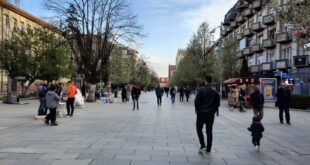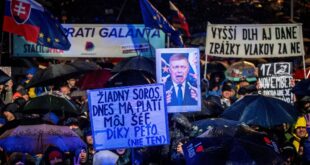SARAJEVOÂ – Ethnic Serbs in Bosnia and Montenegro reject Kosovo’s declaration of independence from Serbia and will try to block its recognition by their own countries, officials said on Monday.
The Serb Republic, the autonomous Serb half of Bosnia, said it “neither recognizes nor accepts” Sunday’s secession, and Prime Minister Milorad Dodik and President Rajko Kuzmanovic branded Kosovo’s declaration an “unacceptable act”.
Their joint statement made clear the Serb half of Bosnia would stop the central government in Sarajevo recognizing Kosovo regardless of the wishes of the more sympathetic Muslim-Croat federation, its partner in the fragile state.
“The Serb Republic will not allow any Bosnian institution to recognize or establish bilateral links with unilaterally declared independent Kosovo,” the statement said.
Bosnia’s Serbs have been only unwilling partners in Bosnia since the Dayton accords that ended the 1992-95 war. In recent years, they have looked to Kosovo as a precedent they could use to also secede, possibly uniting with Belgrade.
There were mass protests in the regional capital Banja Luka on Sunday and Monday, with some chanting the name of Ratko Mladic, the fugitive war crimes suspect who led the Bosnian Serbs in the war against Bosnian Muslims and Croats. Others sang “Kill, Kill Shiptars”, a pejorative name for Albanians.
Dodik, who has threatened a referendum on secession, said on Monday it would be “difficult to explain to people why the Kosovo principle cannot apply” in the Serb Republic’s case.
Branislav Dukic, head of a veterans’ association, asked the Serb Republic parliament to declare the “self-determination” of the region.
But the international peace envoy for Bosnia, Miroslav Lajcak, said the Balkans had to remain focused on moving towards the EU and not be derailed by Kosovo.
“Any attempt to artificially link Kosovo to Bosnia or its constituent parts must be firmly rejected,” Lajcak said in a statement. “Bosnia is in no way hostage to Kosovo nor is the country open to question under international law.”
In Montenegro, where Albanians are 7 percent of the population and Serbs 30 percent, the government has only said it will wait for a clear reaction from the European Union it hopes to join before deciding whether to recognize Kosovo.
Ethnic Serb parties called for protests coordinated with Banja Luka and Belgrade, but Albanian parties said independence marked a big day for the Albanian people and the entire Balkans.
In Croatia, local Serb leader Milorad Pupovac, whose party is in the ruling conservative coalition, said Zagreb should not rush into recognition, given its own recent history. Most of its small Serb minority fled at the end of the 1991-95 war.
“For Croatian-Serbian relations, another trauma could prove to a big burden,” he told Index.hr news website.
 Eurasia Press & News
Eurasia Press & News



